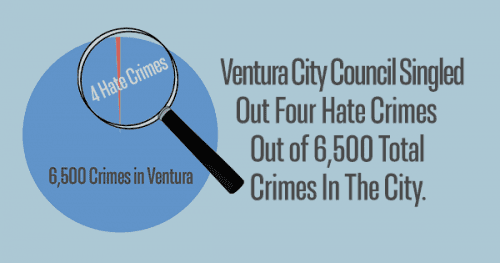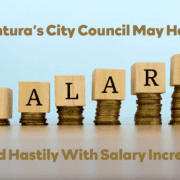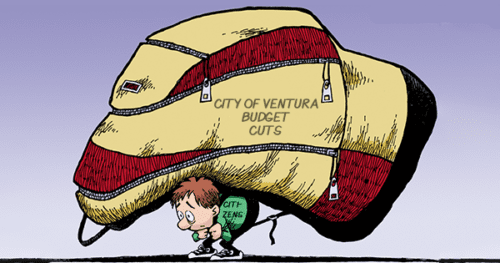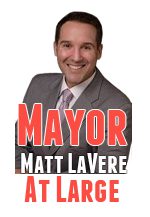Ventura’s 2021 State-of-the-City Address Lacked Visionary Leadership
 “Effective leadership is not about making speeches or being liked; leadership is defined by results not attributes.”
“Effective leadership is not about making speeches or being liked; leadership is defined by results not attributes.”
—Peter Drucker

Ventura Mayor Sofia Rubalcava presented the 2021 State-of-the-City Address (SOTC) in June. Unfortunately, over time, the City Council has lost sight of the purpose of a State of the City address. The speech should aim to praise accomplishments when deserved but not ignore major problems where improvement is needed.
For Mayor Rubalcava, who has only been in public office for three years, her address avoided the topics of the challenges, did not give a sense of vision for the future, or reset the city’s goals as her recent predecessors attempted to do in their speeches.
To many Venturans, a State of the City is a formality—a feel-good report—to make everyone comfortable and have pride in their ‘fair city.’ To others, it is an opportunity to celebrate accomplishments, reset goals and provide a vision for Ventura’s future. However, what the residents need is a candid assessment of how the city will combat its challenges.
What Was Missing in This Year’s State-of-the-City Address
The mayor’s address didn’t mention the city’s critical issues. For example, Ventura has a precarious financial situation, as ranked in the State Auditor’s Report. Mayor Rubalcava ignored it. In addition, she never communicated any vision for how the city could be doing better with the Thomas Fire rebuild, the burden of pensions on the Ventura, the needed street repairs, the growing homelessness on city streets, or economic development. What a missed opportunity.
What We’ve Heard Before
Mayor Rubalcava began by saying, “The city is re-imagining the delivery of city services.” Regrettably, the only thing she discussed was implementing the Matrix Report, something her predecessor, Mayor LaVere, mentioned in last year’s address. Madam Mayor explained the backlogs and gaps in service but glossed over how much of the Matrix Report the city has implemented. Staff reports indicated that the city staff planned to implement 50% of the Matrix Report by June 30, 2021, but they did not meet that goal.
 In 2020, the city implanted a program named Main Street Moves to allow businesses hurt by the pandemic shutdown to serve limited customers outdoors. Forty-seven businesses applied for outside operating permits under the program. Mayor Rubalcava gave an update on business operating permits. By June 2021, the number of companies requesting outside operating permits was 51. Most of the credit for those accomplishments belongs to those implementing them in the prior year.
In 2020, the city implanted a program named Main Street Moves to allow businesses hurt by the pandemic shutdown to serve limited customers outdoors. Forty-seven businesses applied for outside operating permits under the program. Mayor Rubalcava gave an update on business operating permits. By June 2021, the number of companies requesting outside operating permits was 51. Most of the credit for those accomplishments belongs to those implementing them in the prior year.
Mayor Rubalcava lauded The Trade Desk’s multi-million-dollar remodeling of the fourth and fifth floors of 505 Poli—improvements completed in 2020 during Mayor LaVere’s term and mentioned in his 2020 address. Yet, the tenant improvements were not a city accomplishment. The city only leased space to The Trade Desk. The Trade Desk made the needed changes to suit their needs. Mentioning leasing the fourth and fifth floors of 505 Poli attempts to gloss over the Brooks Institute debacle. Leasing the space to the photography school revealed poor management by the Council and the City Manager’s office. A poor decision six years ago cost the community hundreds of thousands of dollars.
The lack of new information is unfortunate because the casual observer believes that the city accomplished very little in 2020-2021.
A Major Undertaking Mentioned in the 2021 State-of-the-City Address
One key point the mayor did make was that the 2021 General Plan update is underway. The updated plan will replace the 2005 General Plan that the city has been using. A 22-member committee is selected and ready to begin work recalibrating the city’s vision for the next 15 years.
Staking Our Vision on a New General Plan
The 2005 General Plan said, “…today in Ventura, as all across America, there is concern about the health of our democracy.
“Over those years, the ability to build consensus about future development has been undermined by sharply polarized divisions, showdowns at the ballot box, and often rancorous public hearings. The complaint often recurs that planning decisions are made without adequate notice or consideration of the views of those affected. Many citizens criticize the City decision-making process as convoluted and counterproductive.”
No one would blame you for thinking our city leaders expressed that vision in 2021, but they didn’t. Yet, the statement was the preamble to Ventura’s 2005 General Plan. The planners faced these conditions in 2005. Not much has changed. In fact, it’s worse.
Sixteen years later, we’re updating the General Plan because the state dictates we do it, yet the same problems persist. What’s more, we have new issues to address, such as recovering from the Thomas Fire and the COVID-19 Pandemic, shaky city finances, repairing our aging infrastructure, water, street repair, economic development and homelessness. Significant challenges, such as these, require visionary leadership.
Unrealistic To Plan 15 Years into the Future
 Long-range planning like this is a fool’s errand. Nobody can look in the future to see what Ventura will need, let alone look 10-15 years in the future. It’s harder still for a 22-person committee. What committee could have predicted the Thomas Fire, the pandemic, Anthony Mele’s murder, and the business shut?
Long-range planning like this is a fool’s errand. Nobody can look in the future to see what Ventura will need, let alone look 10-15 years in the future. It’s harder still for a 22-person committee. What committee could have predicted the Thomas Fire, the pandemic, Anthony Mele’s murder, and the business shut?
Even though long-range planning is nearly impossible, California instructs Ventura to update its General Plan periodically.
One Final Thought on The 2021 State-of-the-City Address: Majoring In Minors
 Mayor Rubalcava spent a good portion of her address describing Ventura Police and Hate Crimes. Several things about that were troublesome. First and foremost, she spent all that time talking about four instances in 2020. While hate crimes have received a great deal of national publicity, four out of 6,500 crimes locally in 2020 is a minuscule number of cases to be singled out and dramatized.
Mayor Rubalcava spent a good portion of her address describing Ventura Police and Hate Crimes. Several things about that were troublesome. First and foremost, she spent all that time talking about four instances in 2020. While hate crimes have received a great deal of national publicity, four out of 6,500 crimes locally in 2020 is a minuscule number of cases to be singled out and dramatized.
Second, when one goes to the Ventura Police site, something there is listed as a “Hate Incident.” It’s a non-crime where someone is demeaned or perceives someone demeans them. Dealing with perception appears to be an unenforceable situation for the police. Furthermore, if the police base the Hate Incident on perceived hate, who is the arbiter of that? Where does free speech end and the hate incident begin? Yet, this seems to be a feckless attempt at posturing to make Ventura appear that it’s in line with the national zeitgeist. Unnecessary, and it detracts from policing the other severe crimes in the city.
Who on the City Council or in the police force considered the costs of implementing the new program? It’s hard to imagine the added bureaucracy and reporting will outweigh the benefit of enforcing the hate incidents.
With so much attention focused on a few hate crimes, it diverted City Council attention from other critical issues like water, pensions, Ventura Fire Department, the fissure between management and staff at City Hall and the homeless.
Editors Comments
 An opportunity exists for the City Council to demonstrate genuine leadership. The results of the last two elections have delivered an unprecedented turnover of all the Councilmembers quickly. The voters expressed their desire for new leaders. Can these new members do something different from the past Councils?
An opportunity exists for the City Council to demonstrate genuine leadership. The results of the last two elections have delivered an unprecedented turnover of all the Councilmembers quickly. The voters expressed their desire for new leaders. Can these new members do something different from the past Councils?
Currently, any direction the city has seems to be haphazard. We see examples of a lack of leadership in a variety of places. Whether it’s a “phone-it-in” State-of-the-City Address, an anemic refreshing of the General Plan, or fretting over a negligible number of hate crimes, it shows the city leaders bounce from one topic to another without regard to the city’s long-term well-being. Voters should not accept this anymore.
Mayor Neal Andrews got it right in his 2018 State-of-the-City Address when he said, “We [Ventura] are no longer a quaint little beach town. We’re among the top 10% of the largest cities in California.” He recognized a truth many of us have known for years. Ventura has urban issues, and we can’t solve urban problems with provincial solutions. We need fresh thinking.
Tell the Council to Tackle the Real Problems that Need Addressing In the General Plan.
Below you’ll find the photos of our current City Council. Click on any Councilmember’s photo and you’ll open your email program ready to write directly to that Councilmember.
 |
 |
|
 |
 |
|
 |
 |
|
 |
For more information like this, subscribe to our newsletter, Res Publica. Click here to enter your name and email address.






 The Council made its November decision based on data presented on September 23, 2020, a month and a half earlier. The Council received no updated data on which to decide. If they had, the decision might have been different.
The Council made its November decision based on data presented on September 23, 2020, a month and a half earlier. The Council received no updated data on which to decide. If they had, the decision might have been different. estimates are optimistic. “We believe we’re conservative not to paint too bleak a picture,” Mr. Coon told the City Council on January 11, 2021. And, our City Council makes long-term decisions based on the short-term data they receive.
estimates are optimistic. “We believe we’re conservative not to paint too bleak a picture,” Mr. Coon told the City Council on January 11, 2021. And, our City Council makes long-term decisions based on the short-term data they receive. It seems clear that city staff provided fluid, optimistic data to the Council for their decision. Mr. Coon explained the projections, saying, “We are feeling alright with the additional projection of $1.5 million in Sales Tax for the current fiscal year. It is something that we definitely want to keep an eye on, especially if we start to see more businesses close.
It seems clear that city staff provided fluid, optimistic data to the Council for their decision. Mr. Coon explained the projections, saying, “We are feeling alright with the additional projection of $1.5 million in Sales Tax for the current fiscal year. It is something that we definitely want to keep an eye on, especially if we start to see more businesses close.



 Mr. McIntyre’s challenges are daunting. The local economy is in shambles. The city government and businesses will struggle to put people back to work safely and quickly. To survive the impending recession will require working closely with the city’s three unions, Fire, Police and Service Employees International Union (SEIU). And, he will have to guide an inexperienced City Council through budgeting during a recession.
Mr. McIntyre’s challenges are daunting. The local economy is in shambles. The city government and businesses will struggle to put people back to work safely and quickly. To survive the impending recession will require working closely with the city’s three unions, Fire, Police and Service Employees International Union (SEIU). And, he will have to guide an inexperienced City Council through budgeting during a recession. personnel-related. These include:
personnel-related. These include: Another Councilmember wants to
Another Councilmember wants to reviewing fee increases to discuss whether a fee should increase by 3% or $5. Such debate appears to be a poor use of City Council time.
reviewing fee increases to discuss whether a fee should increase by 3% or $5. Such debate appears to be a poor use of City Council time. A Safer Approach would be for the City Council and our City Manager to consider a combination of all 13 possible ‘budget-balancing tools.’ What’s more, they should consider deferring a few more pending projects. Take nothing on that list off the table.
A Safer Approach would be for the City Council and our City Manager to consider a combination of all 13 possible ‘budget-balancing tools.’ What’s more, they should consider deferring a few more pending projects. Take nothing on that list off the table.


